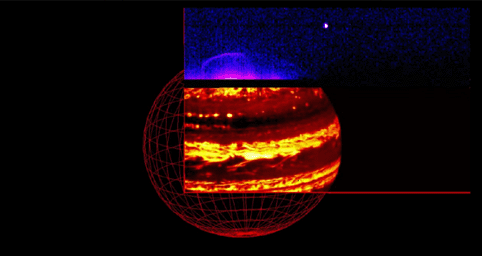
|
Juno Captures Jupiter’s Glow in Infrared Light
- Click the image above for a larger view
 Movie Download Options
Movie Download Options- Full-Res JPEG (1155 x 613) (50.1 kB)
- Full-Res TIFF (1155 x 613) (675.2 kB)
Caption:
As NASA's Juno spacecraft approached Jupiter on Aug. 27, 2016, the Jovian Infrared Auroral Mapper (JIRAM) instrument captured the planet's glow in infrared light.
The video is composed of 580 images collected over a period of about nine hours while Jupiter completed nearly a full rotation on its axis.
The video shows the two parts composing the JIRAM imager: the lower one, in a red color scale, is used for mapping the planet's thermal emission at wavelengths around 4.8 microns; the upper one, in a blue color scale, is used to map the auroras at wavelengths around 3.45 microns.
In this case the exposure time of the imager was optimized to observe the planet's thermal emission. However, it is possible to see a faint aurora and Jupiter's moon Io approaching the planet. The Great Red Spot is also visible just south of the planet's equator.
Background Info:
NASA's Jet Propulsion Laboratory, Pasadena, California, manages the Juno mission for the principal investigator, Scott Bolton, of Southwest Research Institute in San Antonio. The Juno mission is part of the New Frontiers Program managed at NASA's Marshall Space Flight Center in Huntsville, Alabama. Lockheed Martin Space Systems, Denver, built the spacecraft. JPL is a division of Caltech in Pasadena.
More information about Juno is online at http://www.nasa.gov/juno and http://missionjuno.swri.edu .
Cataloging Keywords:
| Name | Value | Additional Values |
|---|---|---|
| Target | Jupiter | Io |
| System | Jupiter | |
| Target Type | Planet | Satellite |
| Mission | Juno | |
| Instrument Host | Juno | |
| Host Type | Orbiter | |
| Instrument | Juno Infrared Auroral Mapper (JIRAM) | Jupiter Infrared Auroral Mapper (JIRAM) |
| Detector | ||
| Extra Keywords | Atmosphere, Color, Infrared, Map, Movie, Rotation, Storm, Thermal | |
| Acquisition Date | ||
| Release Date | 2016-09-02 | |
| Date in Caption | 2016-08-27 | |
| Image Credit | NASA/JPL-Caltech/SwRI/ASI/INAF/JIRAM | |
| Source | photojournal.jpl.nasa.gov/catalog/PIA21036 | |
| Identifier | PIA21036 | |
